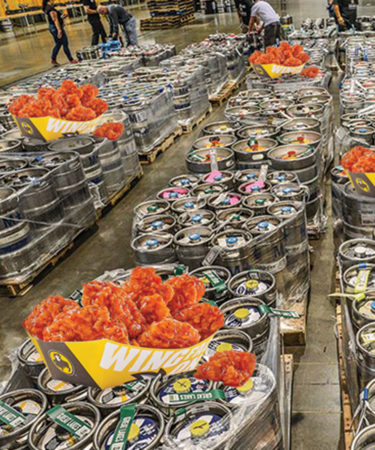Last week, the Brewers Association (BA) announced that Buffalo Wild Wings will be an official sponsor of this year’s Great American Beer Festival (GABF), one of the largest beer festivals in the country. As part of the deal, B Dubs will have its own branded pop-up sports bar at GABF.
At first glance, beer industry members were scratching our heads. How can the BA, the not-for-profit trade association dedicated to small and independent brewers, partner with Buffalo Wild Wings, a corporate restaurant chain owned by Arby’s and best known for mass-produced chicken wings adorned with sauces with names like “Blazin’” and “Desert Heat?” This is particularly confounding when corporate beer brands Anheuser-Busch InBev and MillerCoors were kicked out of their GABF partner positions last year.
Embracing B Dubs may seem weird, but it makes perfect sense. First of all, it’s hardly the first time the BA has partnered with a big corporate entity. In June, the BA announced a similar GABF partnership with Jameson, with the launch of a 12,600-square-foot Jameson Caskmates beer garden featuring special limited-edition, barrel-aged beers from 17 craft breweries.
Besides, B Dubs has a beer-friendly past. Buffalo Wild Wings sells more draft beer than any other restaurant in the country and has championed local breweries since at least 2013.
But more significant than either company’s apparent alignment with craft beer is the simple fact that they aren’t beer. The only big business the BA hates is Big Beer. Its well-documented disdain for global beer companies, namely Anheuser-Busch, is one of its biggest campaigns (see: Take Craft Back). Every other big business, however, is absolutely invited to play ball. In fact, they’re getting a piece of the ticket sales.
So Buffalo Wild Wings, purchased by Arby's last year, will be featured at the Great American Beer Festival. How does this fit into the "independent" criteria of GABF organizers. Well, they're owned by Roark Capital, and private equity counts as "independent" in the GABF's eyes.
— Jason Notte (@Notteham) July 2, 2018
I’m thoroughly confused why the BA banned GABF sponsorships and end-caps from “corporate” brewers last year, but is embracing one of the world’s largest spirits conglomerates onto the floor with an entire beer garden. https://t.co/8MGcM6Io95
— Good Beer Hunting (@goodbeerhunting) June 6, 2018
Whether it’s Pernod Ricard acquiring a craft brewery (which happened earlier this year), baseball stadiums teaming up with craft beer brands, or Guy Fieri launching a brewpub on Carnival Cruise Line, I suspect we’ll be seeing more crossover between big brands and small brewers to come.
And the money moves both ways. Also announced last week was that Ironclad Brewery, a North Carolina brewery and events venue, has launched a venture capital arm. The firm will invest not in beer but in startups — so far, this includes Petrics, a company that develops apps and smart devices for pet owners.
Some people start breweries for the simple joys of creating beer and serving their communities. Others do it to cash in on a burgeoning industry. For plenty of others, it’s both. The BA’s corporate sponsors might seem incongruous, but the festival has to get its money somewhere. If it’s not Big Beer, then it has to be someone else with deep pockets. Everyone’s gotta eat, and you can’t get fat on good intentions.
Constellation Brands Eyes Hispanic Community With Latest Craft Acquisition
On Tuesday, beverage conglomerate Constellation Brands announced its next craft acquisition: Four Corners Brewing of Dallas.
Constellation, whose beer portfolio includes macro brands such as Corona as well as craft brands Ballast Point and Funky Buddha, said the acquisition is “a compelling opportunity for Constellation because Four Corners’ bicultural inspired flavors and branding capitalize on one of the hottest trends in beer — Hispanic-influenced products.”
As craft beer struggles to diversify its fan base to include minorities, such as women and people of color, Big Beer is seeing the economic opportunity of diversity. Latin Americans have extensive cultural ties to beer and brewing. Instead of craft infighting and corporate scapegoating, we should be trying to legitimately bring more people into craft beer’s inner circle. The Brewer’s Association’s diversity committee, and recent appointment of J. Nikol Jackson-Beckham as diversity ambassador, is a start. The growing interest in Mexican-style lagers that use yeast and adjuncts found in Mexican lagers is another.
Constellation already owns U.S. distribution rights for Corona, Modelo, Pacifico, and Victoria. It’s now the proud owner of almost as many U.S. craft breweries. If small beer doesn’t start reaching minority communities, Big Beer certainly will.
